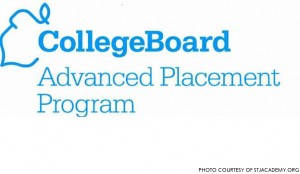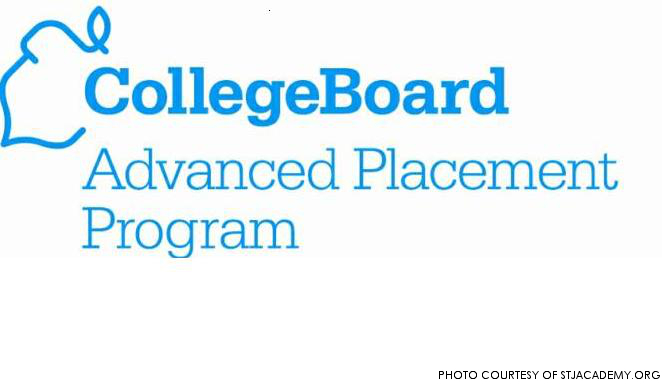
The warning bell reverberates through the halls as the typical AP student enters the building. Cursing his bad luck, “Joe Bob” sprints for the main staircase in a vain attempt to not be late to his AP English III class.
Advanced Placement classes, or APs, are college-level courses that students can take during high school. AP courses typically involve more higher-level thinking and work than the average high school class.
As a trade-off for this higher amount of work, AP courses offer 6 quality points for student’s grade point averages (GPAs), as opposed to a normal level class, which offers 4 points, and an honors level class, which is worth 5 quality points. Quality points are very important to any student looking to go to an Ivy league school, as these colleges typically require high GPAs.
THUD! Joe Bob hits the door at full speed, but luckily for him, Ms. Teacher lets him in. Nodding his thanks, Joe takes a look at his schedule as he tries to locate his seat. “THREE AP CLASSES!” he shrieks at the top of his lungs, eliciting glares from all of his surrounding classmates and Ms. Teacher.
With three AP classes, Joe will have around four hours of notes and homework every night, much more than the average student.
The pace at which students learn is also much faster than academic or honors classes. For example: AP US History (APUSH) covers a chapter in roughly two days, while Honors US History covers each chapter in approximately two weeks. While this would typically put students out of the course, some enjoy the notes and reading, as they believe that a little time now is worth saving money–by not having to pay for classes in college–in the future.
Elbrus Batca, junior, said, “I take a lot of AP courses because I want to take advantage of the ability to get college credits for a much lower cost than how much it costs at college.”
By taking APUSH in high school, a student can receive up to six semester hours of college credit. The average cost for a 4-year public university in the United States is $8,240 per year, or $4,120 per semester, and a “full-time student” will take between 12 and 18 semester hours, making each hour worth roughly $275. This means that a student taking APUSH can receive $1650 worth of college credit for $89, which is the cost of the APUSH exam.
“Imagine all the money I’ll save!” Joe thinks aloud, again disrupting his English class.
Students also relish the challenge offered by AP courses.
Shilpa Kancharla, junior, said, “I wanted to challenge myself, and the experience would help make me more strong and responsible for college, as well as help me prepare for college.” Batca said that he enjoys the level of difficulty, and he also enjoys that the classes require more than sleeping to get a good grade.
This “more” that’s required is critical thinking and analysis, which will be used every time that a student writes for a class, as well as in most other assignments. Students must also master the skill of synthesis, as connecting a lot of information and ideas, commonly called SFI by teachers, into a coherent, well-organized essay, is a necessary component of student’s success.
AP classes help to teach these skills, at least in my experience, through more of a “sink-or-swim” mentality. A student failing to organize their essay properly, failing to include enough SFI or failing to have a thesis will “sink”. In order to “swim,” a student must pay attention in class and remember to take lots of notes and complete other assignments. If the student simply sleeps through every class, they will fail, as the required aspects of their work will be missing.
Joe Bob, who typically sleeps through every class, finds himself speechless as his teacher slides the test, with a big red 0 on it, onto his desk. “You need to work harder,” says Ms. Teacher. “I’ll just take the AP test and place out of this so I never have to do it again,” Joe Bob retorts.
In order to do well on the AP exam, however, Bob will have to step up his critical thinking skills. Besides being a crucial aspect of both the class and the exam, critical thinking is used in college courses, which Bob is hoping to take.
Without these vital skills, Bob will have no choice but to flounder and eventually sink, instead of strongly swimming off like other students who took the time to learn how to critically think.
Even if students choose not to place out of the course in college, AP classes are still a great way to prepare for college. David Hunt, Leesville APUSH teacher, said that AP courses prepare students for college because they are more rigorous than high school classes.
Also, Hunt said that students will write more papers in college, and will also have more individual research. However, students in high school will have more interaction with their teacher on a daily basis, allowing them to ask more questions and receive help.
AP courses help students prepare for this writing and lack of interaction by including these basic ideas in their syllabi and schedules, providing yet another positive aspect of taking AP courses.
In short, taking AP courses while still in high school can save money, provide experience for college, and allow students to experience the challenge of the courses.

Leave a Reply